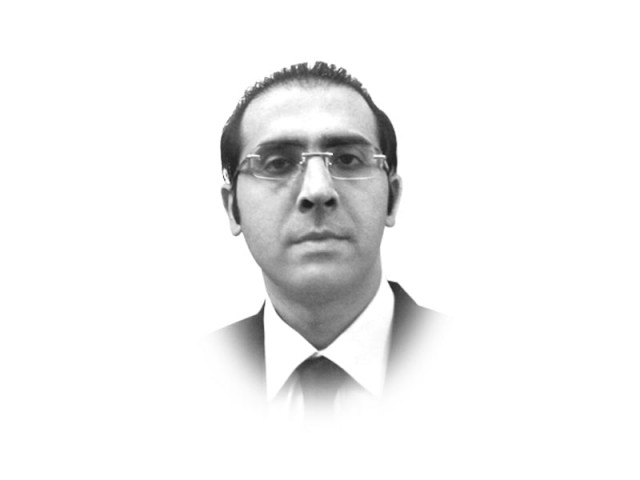The Full Circle, almost
There is a coming of the full historical circle, as Nawaz Sharif assumes the PM slot while Musharraf is in custody.

The writer is a lawyer and partner at Ijaz and Ijaz Co
in Lahore
saroop.ijaz@tribune.com.pk
None of this should be personal, although it is hard not to think of it as personal. Opportunities like these do not present themselves very regularly. A military dictator caused this country to be amputated, ordering mass killing. Another military adventurer also denied Shaheed Zulfikar Ali Bhutto a proper funeral. The Commando did not allow Mian Sahib to attend his father’s funeral. One should not kick when someone’s down as a general principle, yet it is trumped by the greater principle of fairness. General (retd) Musharraf has to be held accountable for treason and most significantly insulting us as a people. The Commando has been granted bail in BB’s murder case and will probably get it in Nawab Bugti’s case. The prosecutor in BB’s case was mysteriously murdered and that has already been forgotten, it seems. To be fair, it would be extremely difficult to hold him immediately criminally responsible for these murders due to requirements of proof. As far as treason is concerned, no formal proceedings have really started.
The formal legal arena is, perhaps, not the best place for deciding what is treasonous and what is not? Treason is a political issue and needs political determination. The logical culmination will indeed take place in the court, and hopefully, if and when that point arrives, the courts will be up to the task. Yet, the moral force has to come from the people, from parliament. An example is Yahya Khan being declared a “usurper” by the Court, without the requisite national consensus on military intervention. The Commando has already been humiliated and more importantly rejected, so why bother now? Why risk “institutional conflict”, argue the realists. There is a lot of merit in this argument. However, what really is “institutional stability”; does that mean beware of upsetting certain quarters too much or else, you know, the system might be “derailed”.
Once we agree that it is not personal, a logical corollary is that no one person has the right to forgive and forget. Let us have the national conversation on what needs to be done with General (retd) Musharraf and those directly complicit. ‘Moving on’ is sagacious advice and we should but only once clear responsibility has been fixed.
Why the Commando has to be held accountable by us, as a people? Firstly, it is the right thing to do. Secondly, the people need closure. Finally, that challenge has not faded away yet. While free and fair elections were being conducted and now as the post-electoral euphoria goes on, bullet-riddled dead bodies keep getting dumped in Balochistan. Mian Sahib has made all the right statements on forming a Kargil Commission, normalising relations with India, making known the findings of Abbottabad and Saleem Shahzad Commissions. It is important that everyone in parliament urges him to keep his word and support him when he does. It might be useful to read the appropriately named report, “Roots of Impunity” released by the Committee to Protect Journalists. Amongst other things, the opinion of the establishment on politicians, politics and democracy is disturbing, yet fascinating. The views of some powerful people in the country are exactly what the stereotype would lead you to believe.
Mian Nawaz Sharif has displayed signs of maturity in the past five years (barring the representative failure of his role in the Memo proceedings) and has displayed some clarity on the civil-military relationship question. Truth and reconciliation works both ways. The onus is also on Mian Sahib to come clean on the Asghar Khan case. He already has the mandate of the people. A statement made to the people of this country on his past follies, particularly the formation of the IJI and the 1990 election, will only help him, and the people of this country.
As far as the argument of institutional harmony is concerned, trying the Commando will only help in the long run. Our armed forces at present fight for the survival of this country and need all the support of the parliament and the government. Yet, the drawing of lines which cannot or should not be breached will bring clarity.
Mian Sahib’s opening statement on the willingness to negotiate with the Taliban is not a confidence-inspiring start. His view is admittedly milder than that of Mr Khan. Yet, the difference seems to be quantitative and not qualitative. The TTP has extended the customary response to the “offer of peace” by Mian Sahib at the centre and the PTI in Khyber-Pakhtunkhwa, with bomb blasts in Quetta and Peshawar. The soft line on extremism during the campaign was electioneering, and even if one forgives it (very, very hard to do, mind you), there are absolutely no excuses post elections.
Published in The Express Tribune, May 26th, 2013.
















COMMENTS
Comments are moderated and generally will be posted if they are on-topic and not abusive.
For more information, please see our Comments FAQ